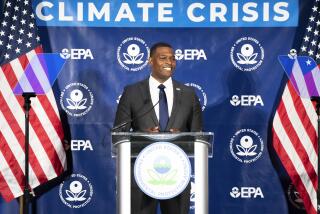U.S. Says It Can Cut Output of Carbon Dioxide Further : Emissions: The Bush Administration estimate may ease standoff with other industrial nations.
- Share via
WASHINGTON — Preparing for final negotiations on a treaty to address the threat of global warming, the Bush Administration told world governments Friday that the United States can reduce its annual output of carbon dioxide by 125 million to 200 million metric tons by the year 2000.
The estimated cutback was viewed as a potential break in a months-long standoff between the United States and other industrialized nations. It came after weeks of debate between officials from the Environmental Protection Agency, the Department of Energy, the Office of Management and Budget and the White House.
To reach those levels, carbon dioxide output would have to be reduced by between 7% and 11% from previous projections, putting the United States quite close to the European objective of stabilizing emissions at 1990 levels by the year 2000. Administration sources said the new estimate could put the United States within 1.5% to 5.5% of the year 2000 target.
Delegates from more than 100 countries are to convene at the United Nations next Thursday for the last round of talks on the proposed treaty. Leaders have warned that the final obstacles must be removed during the weeklong session if the treaty is to be signed as planned at the June “Earth summit” in Brazil.
Administration critics in the environmental community and on Capitol Hill hailed the new estimate as potentially the most significant development in months.
An aide to Rep. Henry A. Waxman (D-Los Angeles), chairman of the House Energy and Commerce subcommittee on health and the environment, said the estimate is “very significant because it shows that stabilization can be achieved and that programs are in place to get us there.”
Administration sources, however, said there has been no change in U.S. opposition to the European demand that a climate treaty require stabilization of carbon dioxide emissions by 2000. Nor is there any indication that the Europeans will retreat from their position during the final round of talks.
One participant in the last weeks of Administration talks said Friday it is unlikely that the impasse will be resolved in those discussions, which will be held a month before the Brazil summit.
President Bush still has not indicated whether he will be among as many as 100 heads of state expected to attend the extravaganza in Rio de Janeiro. Administration sources said it is increasingly likely that he will attend, however, and that if he does, he will consider it necessary to play a positive role.
The carbon dioxide dispute has dogged the climate negotiations from the first day.
Produced by the combustion of fossil fuels, carbon dioxide is the principal man-made pollutant that many scientists believe could cause a possibly devastating increase of two degrees to eight degrees in the global temperature in the next century. The United States is responsible for nearly one-fourth of the world’s carbon dioxide output.
In the message to its negotiating partners, the Bush Administration on Friday estimated that it can cut its emissions by 75 million to 108 million metric tons by making more efficient use of electricity, and by 87 million to 121 million tons by switching from oil to natural gas, improving transportation efficiency and taking other steps embodied in the national energy strategy. The figures add up to more than the estimated total cut of 125 million to 200 million tons. The Administration said the difference results from a “rebound effect” expected to occur because efficient technologies will lead to an increase in energy demand.
Administration officials had been debating the estimates steadily since the end of the last round of treaty negotiations. Some EPA officials said measures under way or already promised could bring about stabilization, while Energy Department estimates of carbon dioxide production remained significantly higher.
More to Read
Sign up for Essential California
The most important California stories and recommendations in your inbox every morning.
You may occasionally receive promotional content from the Los Angeles Times.










